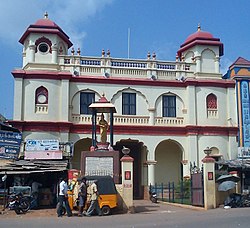Velu Nachiyar
| Rani Velu Nachiyar | |||||
|---|---|---|---|---|---|
| Queen of Sivagangai Princess of Ramanathapuram | |||||
 Velu Nachchiyar on a 2008 stamp of India | |||||
| Reign | c. 1780-c. 1790[1] | ||||
| Coronation | 1780 | ||||
| Successor | Vellacci[1] | ||||
| Born | 3 January 1730 Ramanathapuram, Tamil Nadu, India | ||||
| Died | 25 December 1796 (aged 66) Sivaganga, Tamil Nadu, India | ||||
| Burial | 25 December 1796 Sivaganga, Tamil Nadu, India | ||||
| |||||
| Dynasty | Sethupathi | ||||
| Father | Chellamuthu vijayaragunatha Sethupathy | ||||
| Mother | Muthathal Nachiyar | ||||

Rani Velu Nachiyar (3 January 1730 – 25 December 1796) was a queen of Sivaganga estate from c. 1780–1790. She was the first Indian queen to wage war with the East India Company in India.[2][3] She is known by Tamils as Veeramangai ("brave woman").[4]
Life
Velu Nachiyar was the princess of Ramanathapuram and the only child of King Chellamuthu Vijayaragunatha Sethupathy and Queen Sakandhimuthathal of the Ramnad kingdom.
Nachiyar was trained in many methods of combat, including war match weapons usage, martial arts like Valari, Silambam, horse riding, and archery. She was a scholar in many languages and was proficient in languages like French, English and Urdu.[3] She married the king of Sivagangai, with whom she had a daughter. When her husband, Muthuvaduganathaperiya Udaiya Thevar, was killed in a battle with EIC soldiers, she was drawn into the conflict. She escaped the battlefield with her daughter.[5]
During this period, she formed an army and sought an alliance with Hyder Ali with the aim of launching a campaign against the East India Company in 1780. When Velu Nachiyar found the place where the EIC stored some their ammunition, she arranged a suicide attack on the location, blowing it up.[6][7][8] Nachiyar reinherited the kingdom of her husband, and ruled it for ten more years.[9] In 1790, the throne was inherited by her daughter Vellacci.[1] She granted powers to her daughter with the Marudu brothers to help with the administration of the kingdom in 1780. Velu Nachiyar died a few years later, on 25 December 1796.[10]
Popular culture
On 31 December 2008, a commemorative postage stamp in her name was released.[11]
OVM Dance Academy of Chennai presenting "VELU NACHIYAR" a Grand Dance Ballet on Sivaganga Queen.
Professor A.L.I., a Tamil-American hip-hop artist, released a song dedicated to Velu Nachiyar entitled "Our Queen" as part of his Tamilmatic album in 2016.[12]
On 21 August 2017, a grand dance ballet was conducted in Naradha Gana Sabha in Chennai depicting the life history of the queen Velu Nachiyar. The play was directed by Sriram Sharma, who researched on the Queen's life history for almost a decade.
See also
- Puli Thevar
- Indian independence movement
- Indian independence activists
- Vellore mutiny of 1806
- Kuyili
- Suicide Attack
References
- ^ a b c K. R. Venkatarama Ayyar (1938) A Manual of the Pudukkóttai State. Sri Brihadamba State Press. p.720
- ^ Rohini Ramakrishnan (10 August 2010) Women who made a difference. The Hindu.
- ^ a b Remembering Queen Velu Nachiyar of Sivagangai, the first queen to fight the British. The News Minute. 3 January 2017
- ^ "Veeramangai Velu Nachiyar". The Hindu Business Line. Chennai, India. 18 January 2019.
- ^ Soma Basu (24 December 2007). "Uphill, for history's sake". The Hindu. India. Archived from the original on 28 February 2008.
- ^ "Of woman power and Tamizh glory". IBN Live. Chennai, India. 14 June 2011.
- ^ "Tamil Nadu to build memorial for freedom fighter Kuyili". Times of India. Chennai, India. 16 May 2013. Retrieved 13 August 2014.
- ^ "A Durga A Day-Day 6: Mata Katyayini-Rani Velu Nachiyar and Kuyili". Chennai, India. 15 October 2018.
- ^ Rohini Ramakrishnan (14 August 2010) Women who made a difference. The Hindu.
- ^ "History-Sivaganga district". Sivaganga dist. – Tamil Nadu govt., India. Retrieved 24 November 2011.
- ^ "India Post – Stamps 2008". Postal department, Government of India.
- ^ "International Women's Day Dedication to Queen Velu Nachiyar". professorali.com. 7 March 2016.
